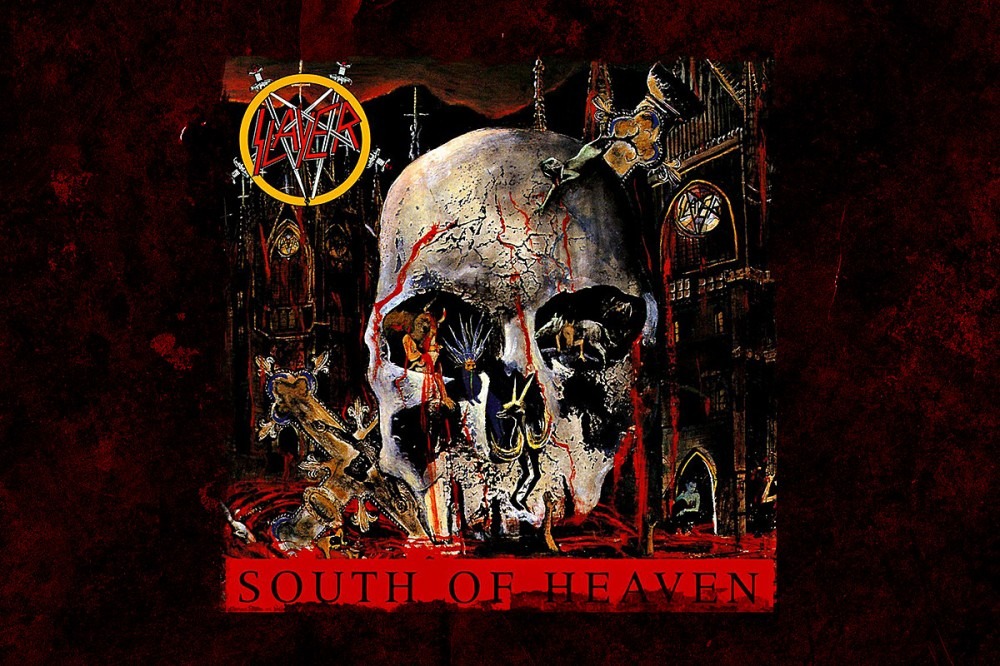
34 Years Ago: Slayer Release ‘South of Heaven’
Slayer fans were still reveling in the whiplash-inducing torment of the band’s 1986 thrash-fest Reign in Blood and the torrential tour to support it when the band members slammed on the brakes and started working on the slower, more atmospheric songs that would make up South of Heaven, which was released July 5, 1988.
The album marked a turning point for Slayer and elicited a somewhat ambivalent response. Many fans yearning for a continuation of the blinding ferocity of Reign in Blood were disappointed by the more restrained songcraft on South of Heaven. Others, who either didn’t vibe with the hardcore tempos of Reign or liked to hear bands progress from one album to the next, were ecstatic that Slayer were experimenting more with textural interludes, mid-paced tempos and vocals that approached actual singing. And long after its release, the title track, “Silent Scream,” “Mandatory Suicide” and “Ghosts of War” remained fan favorites and staples of the group’s live set.
Slayer, "South of Heaven" (Live)
“The album was a late bloomer,” vocalist Tom Araya told Decibel. “It wasn’t really received well, but I guess it kind of grew on everybody later. It was something that we purposely did different. It wasn’t fast, and it didn’t have that Reign in Blood effect.”
In retrospect, it would have been impossible, or at least pointless, for Slayer to follow up Reign in Blood with another symphony of speed. That album was so universally regarded as the pinnacle of thrash that if they had prioritized velocity over all else there was no way the record would have come off as anything but a pale imitation.
“It was just like, we’re not going to be able to top that whole album,” guitarist Jeff Hanneman told Revolver. “We’re not going to be able to beat that. That’s why we did South of Heaven and Seasons [In the Abyss]. We just kind of mellowed out a little bit — not mellow, but slowed down.”
In addition to pulling back on the reigns and writing more nuanced and harmony-laden material, Slayer replaced lyrics about serial killers and cartoon evil with themes of lust, greed, corruption and war.
With South of Heaven Slayer clearly wanted to develop beyond the full-on thrash mold it helped conceive and explore other realms of sound. But there’s likely another reason South of Heaven is such a dramatic departure from previous albums. Guitarist and songwriter Kerry King had just gotten married and was largely absent during the songwriting process, leaving Hanneman to creatively guide the band.
“That album was my most lackluster performance,” King admitted to Decibel. “I had just gotten married and moved to Phoenix [Arizona], so I was probably the odd man out at that point, and I’m sure I didn’t participate as much because of that.”
“We go through dry spells sometimes,” added Hanneman. “But the good thing about having two guitar players that can write music is that you’re never gonna go without. I guess at that time, Kerry was hitting a dry spell.”
The dry spell motivated Slayer to add a cover of Judas Priest’s “Dissident Aggressor” to the album so it would have 10 full tracks. King said the album also had some filler. Neither he nor Hanneman thought much of “Behind the Crooked Cross” and King still considers “Cleanse the Soul” one of the worse songs in Slayer’s catalog. King also wasn’t thrilled with Araya’s vocals, which he felt were too melodic. “I think Tom backed off too much with his singing, or should I say, added too much singing,” he said. “Honestly, it’s one of my least favorite Slayer albums.”
Slayer, "Dissident Aggressor"
Slayer started recording South of Heaven with Rick Rubin – the band’s second album with the legendary producer – in December of 1987 and worked at Hit City West in Los Angeles. Additional work was done at Chung King in New York and the album was mixed at NYC’s New Fresh Studio. South of Heaven debuted at No. 57 on the Billboard album chart and was certified gold by the RIAA on Nov. 20, 1992.
After Slayer performed Reign in Blood in full in 2004, there was speculation that they would do the same to celebrate South of Heaven. Araya was into the idea of doing a show that would incorporate South of Heaven songs with material from 1990’s Seasons in the Abyss. But King quickly shot down the idea, arguing that Slayer’s set needed to feature both fast and slow songs to create peaks and valleys in the set.
Despite King’s general unhappiness with the record, South of Heaven remains a fan favorite and Slayer and their management thought enough of the album to feature 40 percent of the tracks on their box set Soundtrack to the Apocalypse along with a demo of the title track recorded at Hanneman’s house.
“I think South of Heaven was an interesting period for us and we did some great stuff for it,” Araya told me in 2015. “I still like it and it reflects where we were at the time. We had to make that record at that point. There’s nothing else we could have done and it came out really good.”
Slayer, "Mandatory Suicide"
Loudwire contributor Jon Wiederhorn is the author of Raising Hell: Backstage Tales From the Lives of Metal Legends, co-author of Louder Than Hell: The Definitive Oral History of Metal, as well as the co-author of Scott Ian’s autobiography, I’m the Man: The Story of That Guy From Anthrax, and Al Jourgensen’s autobiography, Ministry: The Lost Gospels According to Al Jourgensen and the Agnostic Front book My Riot! Grit, Guts and Glory.
Every Slayer Song Ranked